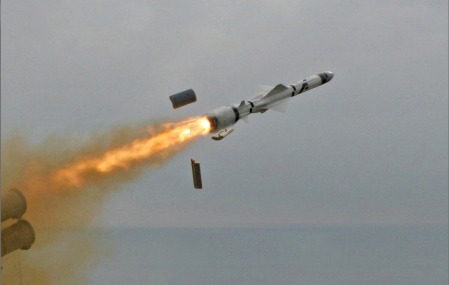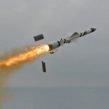
Despite Arms Sales Accord with Israel, Russia Sells Anti-Ship Missiles to Syria
Publication: Eurasia Daily Monitor Volume: 7 Issue: 194
By:

Russia may have refused to sell the S-300 missile to Iran, but it is hardly refraining from selling weapons to its traditional Middle Eastern friends. Despite its recent agreement to buy drones and other military equipment from Israel and a strong Israeli and US diplomatic campaign against such initiatives, Russia announced the sale of P-800 Yakhont anti-ship missiles to Syria. Naturally, this sale has provoked great anger in Israel which argues that these weapons, like other Russian arms sales to Syria in the past, will end up in Hezbollah’s arsenal (ITAR-TASS, September 20; Ha’Aretz, August 27; Interfax, August 31; Jerusalem Post Online, August 31; ITAR-TASS, September 17; Krasnaya Zvezda, September 7).
Although Israel’s anger is unfeigned and quite strong, it should not have been surprised. After all, for a long time Moscow has been selling weapons to Damascus and blithely denying that they ended up in Hezbollah’s hands. Indeed, Moscow has all along maintained that Syria should be involved in not only the Israeli-Arab and Palestinian peace process, but also in the settlement of the Iraq war (Interfax, February 9, 2007, Ministry of Foreign Affairs of the Russian Federation, September 8, 2006). Moscow’s motives are not difficult to discover here. Apart from the revenues it gains, it keeps Syria as an ally and prevents the US from making progress on a comprehensive Middle East process even before it became clear that the Israeli-Palestinian talks were in trouble. By selling these arms to Syria, Russia upholds its position in the area. Since Russian analysts were more or less convinced that the talks between Prime Minister, Binyamin Netanyahu, and President, Mahmoud Abbas, would fail, Moscow is determined to play a role in the Middle East settlement because retrieving its old position in the area has been a consistent goal of Russian foreign policy under Vladimir Putin (ITAR-TASS, September 9; Rossiya 24, September 16; Izvestiya online, September 1).
Consequently, if Russia has decided to step back for now from Iran by refusing to sell it weapons, it makes great sense for Moscow to resume and upgrade its ties to Syria. But, the cold-bloodedness of this policy should not be underestimated. Russia essentially voided its contract with Iran, claiming (quite falsely) that the UN resolution of June 2010 barred weapons sales to it (after the US had carved out an exception for its arms sales), but refused to renounce sales to Syria because the Syrians had signed a contract, just like Iran had done (Yediot Aharonot, September 24). However, while Moscow received kudos from Washington for backing away from Iran despite the weapons being returned, this two-faced relationship with Israel might cost Russia severely.
The conjunction of this deal, following immediately upon conclusion of the bilateral deal to produce Israeli drones and other systems for Russia, provoked an outburst of anger in Israel. Prime Minister Netanyahu stated that there has to be a military response to the sale of missiles to Syria (Ha’Aretz, September 19). Similarly there are now threats by Israel to sell weapons to Georgia since Russia has shown that it does not have much respect for Israeli interests. Those sales to Georgia were halted after the Russia-Georgia war in August 2008, but clearly there has been an insufficient quid for Israel’s quo (Yediot Aharonot, September 19). There are also reports of an Israeli reconsideration of its unmanned aerial vehicle (UAV) sales to Russia in light of this deal (Jerusalem Post Online, September 24). Israeli commentators now suggest that Russia is an irresponsible country whose words are belied by its actions (this should hardly be news to such observers) (Yisrael Hayom, September 19).
Russian commentators, for their part, claim that previously Moscow had desisted from selling Syria Iskander-e missiles at Israel’s behest and that it had cancelled the S-300 contract with Iran. Therefore, bilateral relations “require mutual respect and consideration for each other’s interests” (Ekho Moskvy, September 19). However, it is clear that insofar as Israel is concerned, Russia demands consideration for its interests, not Israel’s. Thus, in 2007 the Russian Ambassador to Israel, Andrei Demidov, stated that it is essential for Israel to talk with Hamas no matter what it does. But, when asked about Russia’s refusal to talk with Chechen separatists, Demidov stated that this is because the Chechen problem is an internal Russian one: “We decide how to settle the problem.” Moreover, in complete defiance of the facts, he claimed that Moscow has settled it by peaceful means and created a government, parliament, and judicial system there. Demidov even recommended that Israel learn from Russia (Jerusalem Post, February 16, 2007).
This breathtakingly hypocritical statement shows the true Realpolitik calculations behind Russian policy along with the implicit belief that Israel is not truly a sovereign state. So while Russia’s sovereignty is inviolable, it can tell Israel to negotiate with terrorists who wish to destroy it. Not surprisingly, Israel has replied that Hamas is no different than the Chechen terrorists and just as it supported Russia against them it demands Russian support against Hamas (www.ha’aretz.com, May 13). But, this line falls on deaf ears in Moscow. Thus, the Kremlin still opposes any US consolidation of the Middle East and is willing to flirt with terrorists by being their indirect source of weapons in order to compel the US to admit it to partnership in the Middle East. Russia may have stopped selling Iran weapons for now, but it is unlikely to be a genuine partner for peace in the Middle East.




